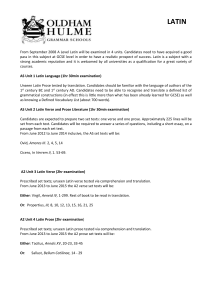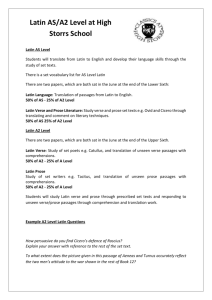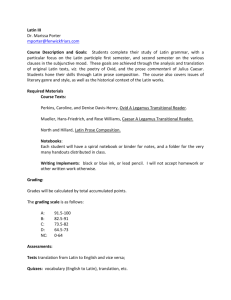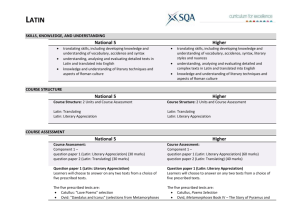Evidence Requirements for the Unit
advertisement
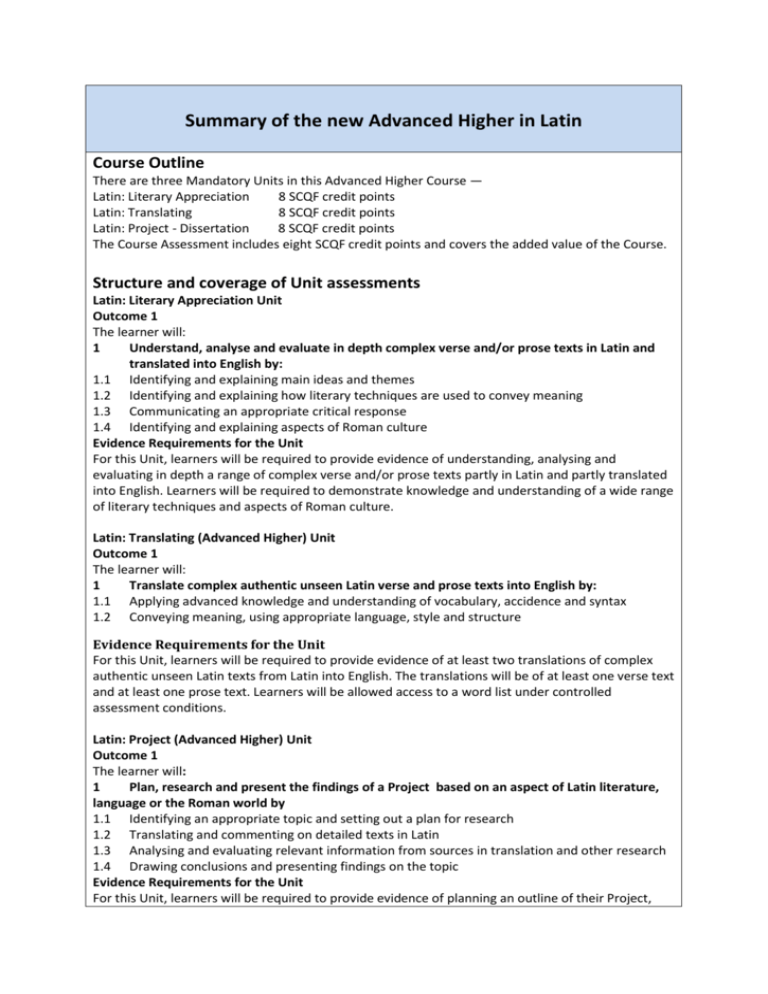
Summary of the new Advanced Higher in Latin Course Outline There are three Mandatory Units in this Advanced Higher Course — Latin: Literary Appreciation 8 SCQF credit points Latin: Translating 8 SCQF credit points Latin: Project - Dissertation 8 SCQF credit points The Course Assessment includes eight SCQF credit points and covers the added value of the Course. Structure and coverage of Unit assessments Latin: Literary Appreciation Unit Outcome 1 The learner will: 1 Understand, analyse and evaluate in depth complex verse and/or prose texts in Latin and translated into English by: 1.1 Identifying and explaining main ideas and themes 1.2 Identifying and explaining how literary techniques are used to convey meaning 1.3 Communicating an appropriate critical response 1.4 Identifying and explaining aspects of Roman culture Evidence Requirements for the Unit For this Unit, learners will be required to provide evidence of understanding, analysing and evaluating in depth a range of complex verse and/or prose texts partly in Latin and partly translated into English. Learners will be required to demonstrate knowledge and understanding of a wide range of literary techniques and aspects of Roman culture. Latin: Translating (Advanced Higher) Unit Outcome 1 The learner will: 1 Translate complex authentic unseen Latin verse and prose texts into English by: 1.1 Applying advanced knowledge and understanding of vocabulary, accidence and syntax 1.2 Conveying meaning, using appropriate language, style and structure Evidence Requirements for the Unit For this Unit, learners will be required to provide evidence of at least two translations of complex authentic unseen Latin texts from Latin into English. The translations will be of at least one verse text and at least one prose text. Learners will be allowed access to a word list under controlled assessment conditions. Latin: Project (Advanced Higher) Unit Outcome 1 The learner will: 1 Plan, research and present the findings of a Project based on an aspect of Latin literature, language or the Roman world by 1.1 Identifying an appropriate topic and setting out a plan for research 1.2 Translating and commenting on detailed texts in Latin 1.3 Analysing and evaluating relevant information from sources in translation and other research 1.4 Drawing conclusions and presenting findings on the topic Evidence Requirements for the Unit For this Unit, learners will be required to provide evidence of planning an outline of their Project, conducting independent research, and presenting their findings, either orally or in written form Structure and coverage of Course assessment Component 1- Question Paper: Literary Appreciation Component 2- Question Paper: Translating Component 3 — Project - Dissertation Total marks 60 marks 50 marks 60 marks 170 marks Component 1 — Question Paper: Literary Appreciation 60 marks understand, analyse and evaluate a range of complex verse or prose texts in Latin and translated into English apply knowledge and understanding of literary techniques demonstrate knowledge and understanding of aspects of Roman culture Learners will answer on either verse or prose questions. There will be one extended response question and a range of short-answer and restricted response questions. Component 2 - Question Paper: Translating 50 marks translate one complex unseen authentic Latin prose text into English apply knowledge and understanding of vocabulary, accidence and syntax convey the meaning of the text in English using appropriate language, style and structure Component 3 —Project – Dissertation 60 marks This dissertation will give learners an opportunity to demonstrate the following skills, knowledge and understanding: extension and application of high-order skills to plan and produce a dissertation presenting the findings of an independent research project. This will explore an aspect of Latin language, literature or the Roman world, chosen by the learners as appropriate to their interests reference skills Points of change Refreshed prescribed texts No scaling of marks Translating Question Paper – now one prose text with access to a wordlist, not a dictionary

